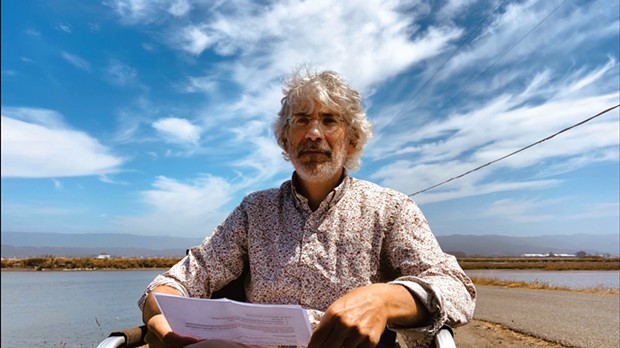Documenting Resilience
New podcast highlights pandemic parenting experiences in Humboldt
By Iridian Casarez [email protected]
Photo courtesy of Ronnie Swartz
Humboldt State University social work professor and Director of the Altruistic Behavior Institute Ronnie Swartz.
[
{
"name": "Top Stories Video Pair",
"insertPoint": "7",
"component": "17087298",
"parentWrapperClass": "fdn-ads-inline-content-block",
"requiredCountToDisplay": "1"
}
]
The initial COVID-19 stay-at-home orders in March of 2020 brought out fear and anxiety for almost everyone, sending the barriers between work, home and relaxation crashing down. Seemingly overnight, homes became offices and where people socialized through a computer screen. For parents and caregivers, they also became playgrounds, schools, daycares, after school programs — everything that was once a part of their kids' lives.
The world as people once knew it was rapidly changing in ways that were extreme and different, so people had to cope and be resilient.
Humboldt State University social work professor and Director of the Altruistic Behavior Institute Ronnie Swartz wanted to highlight just that: how Humboldt County families coped through the initial shutdown of the COVID-19 pandemic. Most importantly, he wanted to create something other Humboldt parents and caregivers could find that resonated, letting them know they weren't alone in their experiences through an unprecedented time.
With the help of a joint grant from First Five Humboldt and the Humboldt County Department of Health and Human Services, he created We Live Here: Humboldt Families Coping with COVID, a podcast, with each episode focusing on a different local's experience.
"The goal was to circulate the lived experience of diverse parents and caregivers of children 0 to 8 years old to highlight the ways in which they've encountered stress and demonstrated resilience," Swartz said, adding that while the description sounds rehearsed, it's true. "That's really what this is about, is highlighting the various forms of stress and resilience in (these) families."
Originally, before the COVID-19 pandemic, Swartz created a different project (titled with the same name: We Live Here) that would bring forth people who live in Humboldt County and were otherwise marginalized to share their stories for others to listen to, understand and relate to. The idea was inspired by a 2018 media campaign created by then HSU master of social work students Amy Mathieson and Erin Youngblood-Smith called "We Are Your Community," which shared the stories of African American HSU students through posters and videos ("A Student Project Seeks to Bridge Humboldt's Campus-Community Divide," April 12, 2018). But then the entire world went into lockdown and it, like so many other events and projects, became a casualty.
But then First Five and DHHS released a call for projects addressing some dimension of Adverse Childhood Experiences (ACEs) or childhood trauma. But more specifically, they wanted projects centered on supporting caregivers and parents of children 0 to 8 (zero meaning pregnant women) and Swartz jumped at the chance.
"How are families doing this? How are they coping with this extreme stress? With such difficulty? With suffering? And how are they demonstrating their resilience and their ability to overcome such extraordinarily difficult circumstances," Swartz said. "It's within the context of COVID. How are these folks surviving in these difficult circumstances because the telling of how people who have done this can be really powerful for those who have lived through it."
Swatrz conducted about 20 interviews from February through March of this year but the editing of the recordings took a lot of time, so he was only able to produce seven episodes. Nonetheless, listening to the stories of Humboldt County parents and caregivers coping from the initial lockdown of the COVID-19 through the first year of the pandemic is eye-opening.
Each episode begins with "We live here," a song by Pat Metheny, then proceeds to a parent or caregiver telling their experiences of how they were able to get through the initial lockdown to the reopening of some schools and how the pandemic has slowly become a new normal for their children. Some women also recount experiences giving birth and taking care of infants during the pandemic.
The podcast, which only uses interviewees' first names, details what it's like to parent during COVID-19, from how hard it was to get kids to focus during distance learning and the difficulty some parents had taking on more roles than just mom or dad to where they found self-care and resilience.
Latrice, who has three children, talked mostly about her experience with her youngest daughter, a kindergartener, who had the most difficulty staying focused on online learning.
"I just found myself advocating for my daughter more and being involved and staying connected to the teacher and school campus," Latrice said in the podcast, adding there are days when her daughter is up for online learning and others where she's not. "That's the hard part, too. The teacher, they have to keep the kids engaged and integrated, but I don't push."
It was an honest podcast, one that gives non-parents and caregivers a look into their experiences.
The episodes also highlight some positives aspects of staying home. In one instance, Mai, a Hmong mother, was excited about having the time to teach her kids more about their culture.
"Because they're home, actually, it's been fun because they're learning certain things in Hmong, or I'll be talking to them in Hmong and I told them, too, 'Oh, this is the perfect time for you to learn Hmong,' because Hmong is not their first language, I think them being home, they understand more," Mai said in the podcast.
Swartz hasn't spoken to any of the parents featured in the podcast since their interviews but said he can only imagine how things have changed, especially given the recent rise in Humboldt County's COVID-19 numbers as students return to school.
"I think things are still pretty damn hard for a lot of families," Swartz said. "I'm sure things for some families are better and I'm sure there are probably some families that things are just as stressful and there's probably some families where things are even harder. Things are tough all over."
He hopes other families, parents and caregivers are able to listen to the podcast and find some solace and comfort hearing similar stories to theirs. But more so, he hopes the Humboldt County community — including parents, caregivers and everyone else — gets a better understanding of itself.
"I loved doing it, and I loved the people who offered to participate in this and share their stories with me and the broader community," Swartz said.
To listen to the full podcast, head to Spotify or Apple Podcasts and search We Live Here: Humboldt County Families Coping with COVID.
Iridian Casarez (she/her) is a staff writer at the Journal. Reach her at 442-1400, extension 317, or [email protected]. Follow her on Twitter @Iridian_Casarez.
more from the author
-
An Upstream Intervention
Open Door hopes state grant will help address impacts of childhood trauma
- Feb 9, 2023
-
Humboldt County Still Working to Implement Organic Waste System
- Feb 2, 2023
-
Earl Robert Bootier: 1945-2022
- Jan 25, 2023
- More »
Latest in News
Readers also liked…
-
Through Mark Larson's Lens
A local photographer's favorite images of 2022 in Humboldt
- Jan 5, 2023
-
'To Celebrate Our Sovereignty'
Yurok Tribe to host gathering honoring 'ultimate river warrior' on the anniversary of the U.S. Supreme Court ruling that changed everything
- Jun 8, 2023
































